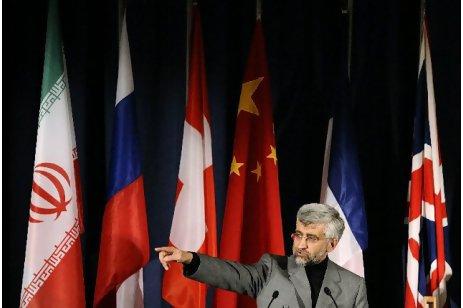Iran and six world powers ended two days of high-stakes nuclear talks in Geneva yesterday with an agreement to meet again early next year in Turkey.
Expectations before the Geneva meeting had been so low, mistrust so deep and the atmosphere so fraught that it was not even certain there would be further talks.
So yesterday's outcome was regarded as a modest success that gives diplomacy breathing space.
Had the talks collapsed, the United States would have pressed for more sanctions against Iran. Failure may also have triggered a military confrontation that neither side wants.
Any new diplomatic process, however, is likely to be long and arduous, while prospects for a final settlement still remain slight, analysts say. But technical problems and apparent cyber-sabotage have disrupted Iran's drive to enrich uranium, allowing more time for diplomacy.
Iran's chief nuclear negotiator, Saeed Jalili, insisted yesterday that Tehran will not discuss suspending enrichment of uranium, the key to its nuclear programme, when the two sides meet in Istanbul at the end of January.
But analysts said that issue was not necessarily the West's key concern at this point. Trita Parsi, the president of the Washington-based National Iranian American Council, which promotes diplomacy to resolve disputes, said: "What the West wants is the opportunity to express its concerns about Iran's enrichment programme - and it will have the chance to do that in Istanbul.
"What is important is that there's been a re-initiation of the engagement process," he said. "You have to start a process of talking so that every time they meet doesn't have to be an historic event. That reduces the pressure and enables greater manoeuvrability for both sides to compromise."
The Geneva talks brought together for the first time in 14 months Iran and the five permanent members of the United Nations Security Council, the US, China, Russia, Britain and France, plus Germany, the so-called P5+1.
The European Union's foreign policy chief, Catherine Ashton, who led the talks for the six nations, said that international concerns about Tehran's nuclear programme had been the focus of the discussions.
In late January, "we plan to discuss practical ideas and ways of cooperating towards resolution of our core concerns about the nuclear issue," Lady Ashton told a news conference.
Mr Jalili, however, maintained a defiant public posture. "We will not talk about Iran's nuclear rights and Iran will never accept pressure," he told Iranian state television.
Iran's unswerving bottom line is that it has the right to enrich uranium on its own territory under international safeguards.
Analysts say that Iran's hardline leaders, who use the nuclear programme to rally nationalist support and distract from political and economic problems at home, are unlikely ever to agree to climb down on enrichment.
Gala Riani of the HIS Global Insight consultancy said: "This government has obviously linked the development of the nuclear programme so closely to its own legitimacy that it would be difficult for them to backtrack on it," said
In Iran, President Mahmoud Ahmadinejad said negotiations could be "fruitful" if years of increasingly stringent sanctions imposed on his were scrapped. But, tacitly accepting this would be a non-starter for the West, he did not make it a condition of further talks.
Instead, Mr Ahmadinejad suggested, lifting sanctions would make the talks "fruitful". At the same time, Iranian officials deny - despite independent evidence to the contrary -- that sanctions are damaging its economy.
Shannon Kyke, a proliferation expert at the Stockholm International Peace Research Institute, said the P5+1 and Iran needed to "break out of a zero-sum game … to a situation where both sides can come away claiming a win."
The P5+1 made a concession by agreeing that the next round of talks are held in Turkey, which Iran views as an ally. Tehran had wanted this week's discussions held in Istanbul, but Lady Ashton rejected the request.
"It's significant that [the next round of] talks will take place in Turkey,' Dr Parsi said. "Trust is in short supply and Turkey has good rapport with Iran while being an ally of the West."
The West suspects Iran's uranium enrichment programme masks a drive to weaponise: Tehran insists is atomic activities are solely designed to generate electricity while it frees oil for export.
Most experts believe the only way to break the deadlock is for the P5+1 to accept some Iranian uranium enrichment.
"We recognise Iran's rights, but insists it fulfills its obligations," Ms Ashton said.
Some in Tehran will interpret this as an implicit acceptance of Iran's bottom line: that it has the right to enrich uranium, albeit under more stringent international scrutiny.
Lady Ashton also said the P5+1 was ready to seek ground with Iran on areas of common interest. This was possibly another concession to Iran, which insists discussions should take into account its role as a major Middle East power and champion of the developing world.
Tehran wants talks to focus on regional security issues, global economic problems and Israel's undeclared nuclear weapons stockpile.
If so, Tehran in turn should accept that the agenda should include the issue of human rights in Iran, Dr Parsi said. Hundreds of pro-democracy activists, journalists, and human rights workers have been detained after Mr Ahmadinejad's "stolen" election last year.

